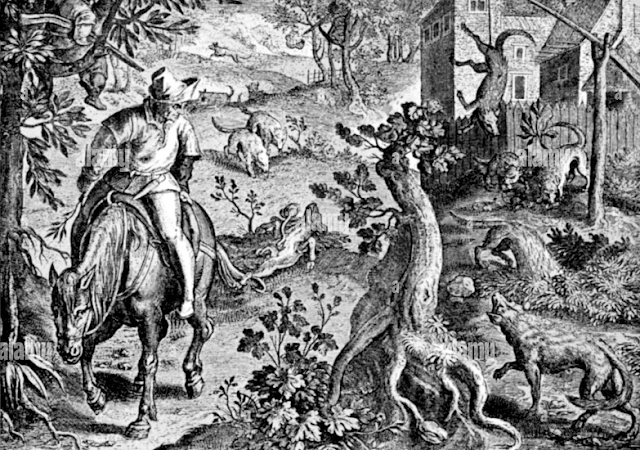2023 Dedh Trei Hans Etek warn Ugens
De Lun, pajwora mis Kevardhu
Monday, 4th December
Bleydhes a dheuth dhe Breten Veur (Kernow ewedh) wòja an Oos Yey, ow sewya an bagasow bestes predh ow tos tre, hedhes rag sampel. Lies bledhydnyow alebma tho anjei lies. Diantel o anjei dhe vab den ha bestes bargen tir. An bobel a beas tribût dhe vaternesow gen crehyn bleydhes. Pelour tòbm a-bris o hedna. Bleydhes a veu helhys dibita ha forests a veu trehys dhe’n dor. Dres an rayn Henry VII (1485-1509) na veu scant lowr anodhans gerys. Ma henwyn teleryow en Kernow (en Kernôwek ha Sowsnek Coth) ow tisqwedhes dr’era anjei òbma.
Wolves came to Britain (including Cornwall) after the Ice Age, following the returning prey animal herds, e.g. deer. Many years ago they were numerous. They were a danger to humans and farm animals. People paid tribute to kings with wolf skins. That was valuable warm fur. Wolves were ruthlessly hunted and forests were cut down. During the reign of Henry VII (1485-1509) there were hardly any of them left. Place names in Cornwall (in Cornish and Old English) show that they were here.
ROSPLETHA (Rosplethe 1278)
Rospleydh “wolf’s roughland”
BLABLE (Bleythpol 1302)
Bleythbol “wolf’s pool”
KERLEY (Crugbleth 1306)
Crugbleyth “wolf’s barrow”
GOLDEN (Wolvadon 1327) wulfa dun (OE)
Wolfdon “wolf hill”
WOOLLEY (Wullegh 1493) wulfa leah (OE)
Wolflea “wolf’s clearing”
Even earlier “Wulf” seems to have been a popular component of personal names:
WOOLSTON (Poundstock)(Ulnodestone 1086)
Wolfnothston “Wulfnoth’s farm”
WOOLSTON (St Ive) (Ullavestone 1086)
Wulflafeston “Wulflafe’s farm”
WERRINGTON (Ulvredintone 1086) (OE)
Wulfredington “farm of Wulfred’s people”


No comments:
Post a Comment